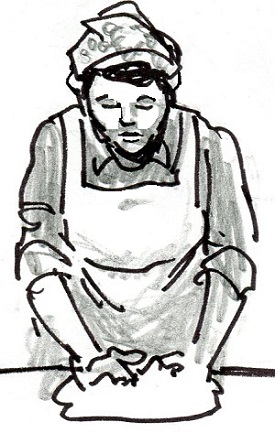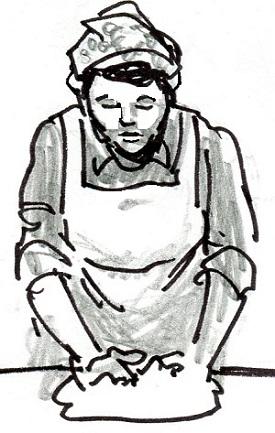

“Do you not know that a little yeast leavens all the dough?” (1 Cor 5:6).
1 Cor 5:1-8; Luke 6:6-11
The Greek word porneia covered a wide range of illicit sexual acts. Greek and Roman culture knew, explored and invented some of them in the pursuit of erotic diversion, and St. Paul was alert to this in Corinth, a port city known for its aberrations. He quickly condemned the activity reported in today’s first reading and warned the faith community that its impact could infect and degrade the spirit among them all like yeast in dough.
Jesus, too, was aware of certain predatory sins that destroyed both their perpetrators and victims. He reserved his harshest rebuke for those who corrupted “little ones,” saying it was better if they had never been born or that a millstone had drowned them. The adage, “the corruption of the best is the worst,” applied to religious leaders who used helpless victims to try and trap Jesus. The Pharisees who caught an adulterous couple “in the act” and dragged only the woman before Jesus to see if he would uphold Moses’ verdict of stoning fit this adage. Like all lynch mobs, it took instigators and a crowd lusting to see the terrified woman killed.
Though today’s Gospel is not about sex, it has the same pornographic feel, a pay per view setup in which a crippled man is callously used to test Jesus’ adherence to the sabbath law. When Jesus uses the same Law to defend life rather than destroy it, the scribes and Pharisees retreat enraged to plot his destruction. Despite their vaunted status, these teachers are filled with malice and corruption.
St. Paul’s image of leaven describes the power of both good and evil. We have plenty of examples of corruption at the top setting the tone for entire organizations. We know that integrity in leadership inspires others to be conscientious. Like leaven, even a small amount of duplicity can diminish the whole, or one example of courage can set a higher standard for everyone. St. Paul calls for a profound interior conversion in Corinth to replace “the old yeast of malice and wickedness with the new unleavened bread of sincerity and truth.”
Discipleship is about continually replacing our inner thoughts and motives with this new leaven, which St. Paul also calls the mind of Christ and the Holy Spirit. As individuals, this is a matter of monitoring what we put into our heads and hearts, including what we read and watch, fantasize and cultivate to shape our desires and behaviors.
As a society, we have opportunities to purge our collective spirits with good choices, by how we participate in social media, what we support with our time, energy and money, and what we deprive of our resources to diminish their influence. Even our small leaven in the whole can make a significant difference.
Advertisement








